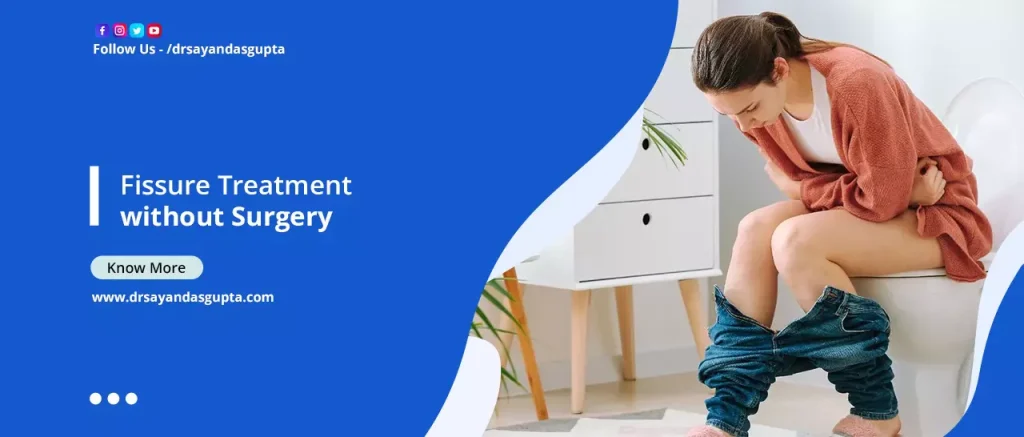Anal fissures are a common yet often misunderstood medical condition. These small tears in the lining of the anus can cause significant discomfort and pain, affecting people’s quality of life. It’s crucial to address the myths and misconceptions surrounding anal fissures to ensure better understanding and management.
In this blog, we’ll separate fact from fiction and provide insights from Dr. DasGupta, a seasoned professor of surgery with over 30 years of experience.
Myth 1: Anal fissures only affect older adults.
Truth: Anal fissures can occur at any age.
While it’s a common belief that anal fissures primarily affect older adults, the reality is that they can occur at any age. They are particularly prevalent among young infants and adults aged 20 to 40. According to Dr. DasGupta, “Anal fissures are often misunderstood, but they can impact anyone, regardless of age or gender. Understanding the true causes is key to effective treatment.”
Myth 2: Constipation is the only cause of anal fissures.
Truth: Multiple factors can cause anal fissures.
Constipation is indeed a significant risk factor for developing anal fissures due to the straining it often involves. However, other factors can also lead to this condition. Straining during bowel movements, childbirth, Crohn’s disease, and even anal sex are notable causes. Dr. DasGupta emphasizes, “Contrary to popular belief, anal fissures are not solely caused by constipation. It’s important to address multiple risk factors to prevent and heal these injuries.”
Myth 3: Poor hygiene causes anal fissures.
Truth: Poor hygiene may irritate an existing fissure but does not directly cause one.
Poor hygiene can exacerbate the discomfort of an existing anal fissure by causing irritation, but it is not a direct cause. Anal fissures develop due to physical trauma or underlying medical conditions, not because of hygiene practices. As Dr. DasGupta notes, “Hygiene and diet play a role in managing the discomfort of anal fissures, but they are not the root cause. Seeking professional advice is crucial for proper care.”
Myth 4: Spicy foods cause anal fissures.
Truth: Spicy foods may worsen the pain but do not cause fissures.
Spicy foods are often blamed for causing anal fissures, but they do not directly cause them. Instead, spicy foods can aggravate the symptoms, making the pain more noticeable. Dr. DasGupta explains, “While spicy foods may worsen the pain of an anal fissure, they do not cause them. It’s essential to understand the difference between aggravating a symptom and causing the condition.”
Myth 5: Anal fissures are contagious.
Truth: Anal fissures are not contagious.
Another common misconception is that anal fissures can be spread from person to person. This is entirely false. Anal fissures are a result of physical trauma and underlying health conditions, not an infectious disease. “Our understanding of anal fissures has evolved significantly, dispelling the myths that once surrounded this condition.
Myth 6: You Should Avoid Physical Activity If You Have an Anal Fissure
Reality: While some activities that put strain on the anal area might be uncomfortable, moderate exercise can be beneficial. Activities like walking can help promote regular bowel movements and overall health. It’s important to avoid exercises that cause significant pain or discomfort.
Myth 7: Anal Fissures Always Cause Severe Pain
Reality: The severity of pain varies from person to person. Some people experience only mild discomfort, while others may have severe pain, especially during and after bowel movements. Chronic fissures may sometimes present with less intense symptoms than acute fissures.
Myth 8: Anal Fissures Are a Sign of Cancer
Reality: Anal fissures are not a sign of cancer. They are benign and usually result from physical trauma or other non-cancerous conditions. However, persistent symptoms should be evaluated by a healthcare provider to rule out other serious conditions.
Myth 9: Diet Has No Impact on Anal Fissures
Reality: Diet plays a significant role in the prevention and management of anal fissures. A diet high in fiber helps to soften stools and promote regular bowel movements, reducing the risk of constipation and straining. Drinking plenty of water is also crucial for maintaining stool consistency.
Myth 10: Anal Fissures Cannot Be Prevented
Reality: There are several ways to reduce the risk of developing anal fissures. These include maintaining a high-fiber diet, staying hydrated, avoiding straining during bowel movements, and treating any underlying conditions that may cause diarrhea or constipation.
Conclusion
Dispelling the myths and misconceptions about anal fissures is crucial for proper understanding and effective treatment of this condition. Recognizing that anal fissures can affect anyone, are caused by various factors, and are not a result of poor hygiene or contagious is essential.
Dr. DasGupta’s, Senior General & Laproscopic Surgeon in Kolkata insights highlight the importance of education and seeking professional medical advice for managing anal fissures. If you or someone you know is experiencing symptoms, consult a healthcare provider to determine the best course of action.
By addressing these myths head-on, we can promote better awareness and management of anal fissures, ensuring those affected receive the care and understanding they deserve.






